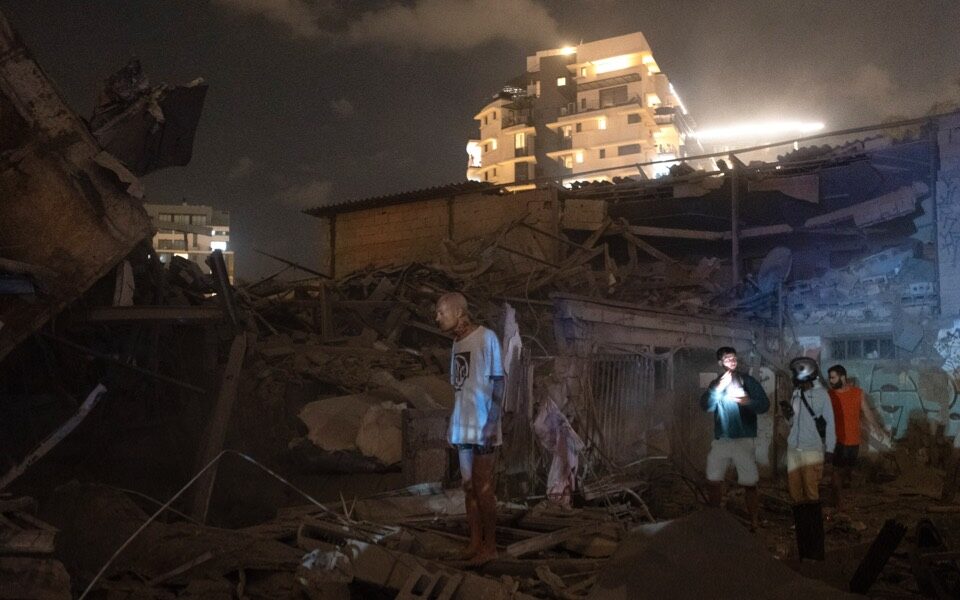Greeks in Israel: ‘We’re alive, for now’
Residents of Jerusalem, Tel Aviv and other Israeli cities recount their experience of the first two days of the Hamas strike

He was woken up at 6.30 a.m. on Saturday by the wail of the air-raid sirens. Makis Levy knew he had 15 seconds to rouse his two children from their beds and get them all safely into the bomb shelter in their home, which is located just 7 kilometers from Gaza. “Rockets started raining down on us at dawn and lasted four or five hours,” he tells Kathimerini. “They [Hamas fighters] simultaneously stormed 22 settlements, killed people in their homes, in shelters and in the streets, and took hostages.”
Levy and his sons spent more than a day hiding out in the shelter before emerging at 5 p.m. on Sunday. The Hamas fighters had not invaded that area, though they had gone into his mother-in-law’s village, where, he says, “they shot everything up.” His mother-in-law escaped the carnage by hiding in her own shelter, which the fighters did not breach.
For those terrifying 36 hours, however, he felt that the end was near. “I was speaking with people on What’s App and when they’d ask me if we’re OK, I’d say, ‘We’re alive, for now,’” he says. “I kept thinking that one of those people would later be the one to say, ‘I was the last person to hear him alive.’”
His greatest concern was to keep his children safe and calm. “Just to give you an idea, if it had been Athens it would have been like living in Palaio Psychiko and hearing that they’d entered Kifissia, then Maroussi and then Neo Psychiko,” he says, describing his mounting terror. “You know they’re getting closer and you’re trapped in a shelter with two kids and no gun. All you have left is prayer,” says Levy. “They were killing everyone in their path,” he adds of the militants.
Levy and his children managed to leave their home safely on Sunday with the help of the Israeli military and police. “It took us two hours to reach Tel Aviv because we headed south at first so as to avoid the words of the trouble,” he says, recounting how he saw no people, just military vehicles on the street for the first few kilometers. “I don’t remember ever experiencing anything like it before,” says Levy, who was staying with friends in Tel Aviv as he tried to get a flight to Greece amid serious difficulties with air connections. “The last time must have been the Yom Kippur War.”
‘You know they’re getting closer and you’re trapped in a shelter with two kids and no gun. All you have left is prayer’
Levy is not the only Israeli to liken the situation today with that in 1973. “The streets were filled with grief, I could hear the lamentation of my neighbors,” remembers Benny Natan, who lives in Haifa, the biggest city in northern Israel, some 150 kilometers from Gaza. “There’s a lot of grief today too, but also anger at the government, at the feeling that we have been abandoned to our fates,” he notes. Natan was 19 years old during the 1973 war and had been living in Israel for two years when it broke out. Now, 50 years later, he described Saturday’s attack by Hamas as “unprecedented.” “No one expected something like this,” he says, adding that the shelves at his local supermarket were already empty on Sunday morning. As far as his own safety is concerned, Natan feels more at risk from Hezbollah than he does from Hamas. “If Hezbollah bombs us from Lebanon, I have just one minute to get to the shelter in my house before the rocket reaches Haifa,” he says.
Residents of Tel Aviv also spent a lot of time in bomb shelters on Saturday, like Yaniv Dimopoulos. “I’ve lived here for 10 years and I have seen several wars and conflicts in my lifetime, but what happened on Saturday was unprecedented in the nation’s recent history,” he tells Kathimerini, explaining how the air-raid sirens there also went off at 6.30 a.m. on Saturday and that he had to run down to the apartment building’s bomb shelter several times over the course of the day. “There were five attacks on the area where I live,” he says, adding that each lasted from between 10 minutes to half an hour. Nevertheless, only schools and a few public services were closed on Sunday. “The people of Israel have learned to live with such things,” he says.
“Everyone is numb and people are worried, but I can’t say there’s anything I’m particularly afraid of,” Christos Trakas, another Israeli Greek, tells Kathimerini, saying that most businesses in Tel Aviv were open on Sunday, though traffic was on the streets. “You basically stay home,” he says, explaining that his house, like other newer structures, is obliged to have a bomb shelter built into the property. That’s where he spent most of Saturday, though unlike Dimopoulos, he is not thinking of leaving the country.
“The Greek Foreign Ministry spoke of efforts to repatriate 149 Greek visitors,” says Dimopoulos, adding that as far as he knows, that number does not include Greeks who live in Israel.
Two of the dozens of people trying to leave the country right now are the daughters of Yvette Nahmia and Ilias Messinas, aged 18 and 16. The parents were in Greece when the attack began and the girls were back home in Jerusalem. “They opened the shelter, cleaned and mopped it, and pulled in the sofas,” says Nahmia. “They are very scared,” she adds, saying that she has not been able to find a flight to get her to her daughters or to bring her daughters to Greece. “I feel like I betrayed them.”
In contrast, Sister Daniila from the Mount of Olives Convent says that she feels very safe in Jerusalem. “The sirens were loud and we could hear the noise from the rockets; the entire house shook, but experience here has taught us to get past such things,” she says. However, it is not just the fact that she remembers living with the sound of sirens from 2014 that gives her this sense of security. “The Al-Aqsa Mosque is here and they won’t risk hitting it,” she tells Kathimerini. Jerusalem was also numb on Sunday. “But it has been my experience that this darkness only lasts for three days. After that, we just have to get on with our lives, that’s all.”





